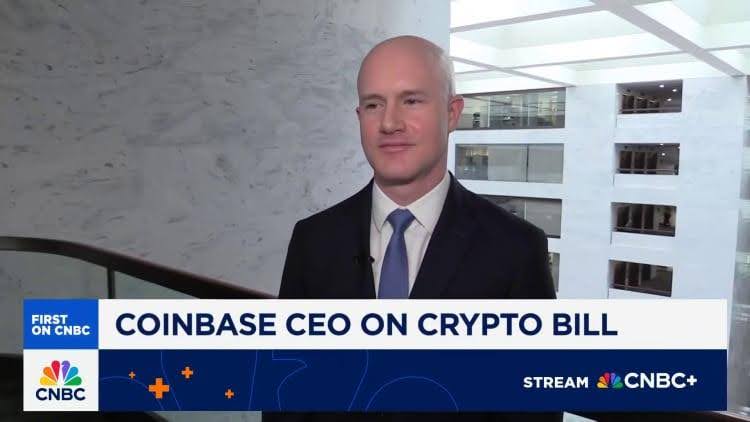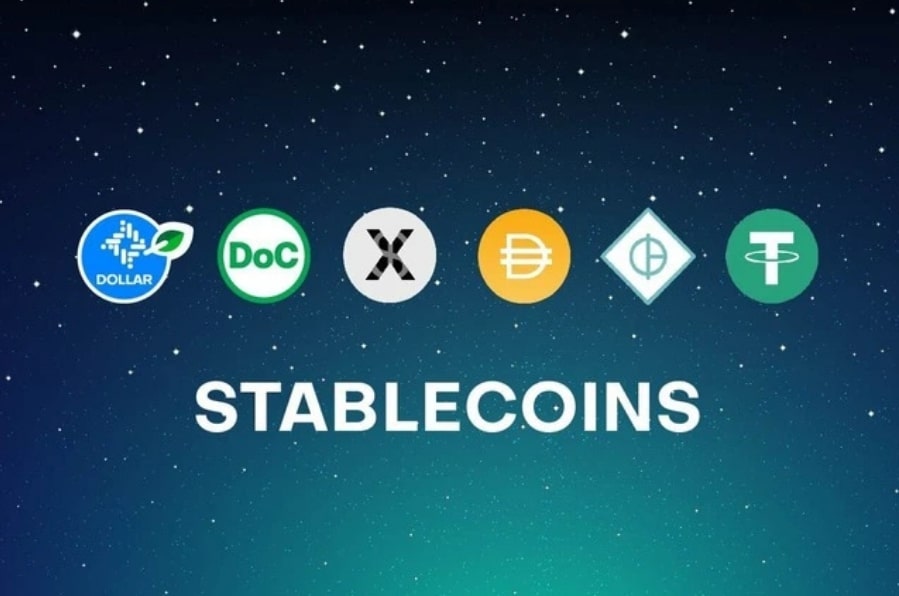Key Takeaways:
- Coinbase CEO says Fortune 500 firms are actively getting ready to combine stablecoin funds.
- Stablecoins are rising as a new income engine for Coinbase, alongside buying and selling and subscriptions.
- Shopify, Amazon, Walmart, and others are already experimenting with blockchain-based cost rails.
Stablecoins are about to go mainstream and never simply amongst crypto natives. In line with Coinbase CEO Brian Armstrong, a number of the largest firms on this planet are shifting towards stablecoin adoption, positioning the U.S. dollar-backed digital property as a future default for international funds.
This isn’t a obscure forecast. It’s already beginning.


Coinbase Sees Surge in Company Demand for Stablecoins
Coinbase’s CEO, talking to CNBC’s Closing Bell Time beyond regulation, confirmed that a number of Fortune 500 corporations are getting into the stablecoin house. Whereas some have made public bulletins, others are quietly piloting blockchain-based cost infrastructure behind the scenes.
“We’re going to see the Fortune 500 actually begin to undertake stablecoins,” Armstrong mentioned. “We’ve already seen it begin.”
He particularly cited Coinbase’s new integration with Shopify, permitting retailers to simply accept funds in stablecoins by way of Coinbase’s pockets and cost API instruments. Armstrong hinted that Walmart, Amazon, and different giants are evaluating related pathways for stablecoin adoption, both for funds, settlements, or treasury administration.
This shift, if absolutely realized, would signify a multi-trillion-dollar market alternative, contemplating the mixed income of the Fortune 500 exceeded $18 trillion in 2024.
Stablecoin Funds, From Crypto Area of interest to International Infrastructure
Stablecoins have lengthy been used throughout the crypto ecosystem for buying and selling, hedging, and DeFi operations. Now, their real-world use instances are starting to take form on a world stage.
What’s driving this adoption?
- Cross-border effectivity: Stablecoins can transfer globally in seconds, eliminating sluggish SWIFT wires and excessive remittance charges.
- Greenback demand overseas: In high-inflation economies like Argentina, Nigeria, or Turkey, stablecoins supply digital entry to the U.S. greenback.
- Monetary inclusion: All customers want is a smartphone to entry stable-value digital {dollars}, no checking account required.
Armstrong sees stablecoins as crypto’s first “daily-use” utility with real-world traction.
“This can be a day by day use case for crypto,” Armstrong mentioned. “Thousands and thousands of individuals all over the world can use stablecoins for funds, particularly in locations with unstable native currencies.”
Learn Extra: Coinbase Reinforces Onchain Ambitions with Opyn’s DeFi Derivatives Pioneers
Stablecoins as Coinbase’s Subsequent Income Engine
Coinbase’s enterprise mannequin has traditionally centered on buying and selling charges. Extra just lately, subscriptions and providers have grown, making up a considerable share of quarterly income. Now, Armstrong sees stablecoin funds as a 3rd core pillar.
With tens of millions of day by day customers already using stablecoins in peer-to-peer and cross-border funds, Coinbase is constructing out pockets providers, on-ramps, and APIs for each retail and enterprise purchasers.
Armstrong described this as a TAM enlargement (Whole Addressable Market) that would diversify Coinbase’s earnings and cut back reliance on risky crypto market cycles.
“Funds is the following large class,” he famous. “And it’s not tied to buying and selling volatility.”
Coinbase’s cost APIs might develop into a monetary backend for international commerce, enabling any enterprise to simply accept stablecoin funds in actual time, with near-zero charges.
Learn Extra: Coinbase CEO’s Crypto Regulatory Meetup in London, What’s Up Subsequent?


Institutional-Grade Infrastructure Unlocks Mass Adoption
The rise in company curiosity comes at a time when U.S. regulators are lastly offering a authorized framework for stablecoins.
The GENIUS Act, just lately handed by the U.S. Home of Representatives, goals to regulate stablecoin issuers, requiring full backing by money or short-term Treasuries and month-to-month transparency experiences.
This authorized readability might encourage extra firms to combine stablecoins with out regulatory hesitation.
Coinbase, as a publicly traded and licensed entity, is well-positioned to offer compliant stablecoin providers. Its collaboration with Shopify marks the start of a broader shift the place crypto infrastructure blends straight into conventional retail platforms.
If stablecoin funds are built-in into platforms like Amazon, Walmart, or Uber, it might cut back service provider charges from ~3% (charged by Visa and Mastercard) to beneath 0.5%, whereas settling in actual time. That alone might save billions yearly in cost processing prices.
What This Means for the Crypto Market
The rising curiosity from company America in stablecoins has wide-reaching implications:
- Legitimization: Huge model adoption reduces client skepticism and normalizes blockchain utilization.
- Infrastructure enlargement: Extra demand for pockets apps, API suppliers, custodians, and cross-chain options.
- Token utility development: Stablecoins like USDC and USDT achieve extra utility, rising on-chain liquidity and quantity.
Extra importantly, it creates a use case that isn’t speculative. Not like buying and selling, stablecoin funds present a sticky, recurring use case that may scale far past present crypto-native audiences.
Coinbase’s technique to lean into this house places it forward of opponents, particularly within the U.S., the place regulatory readability and enterprise demand are aligning for the primary time.





